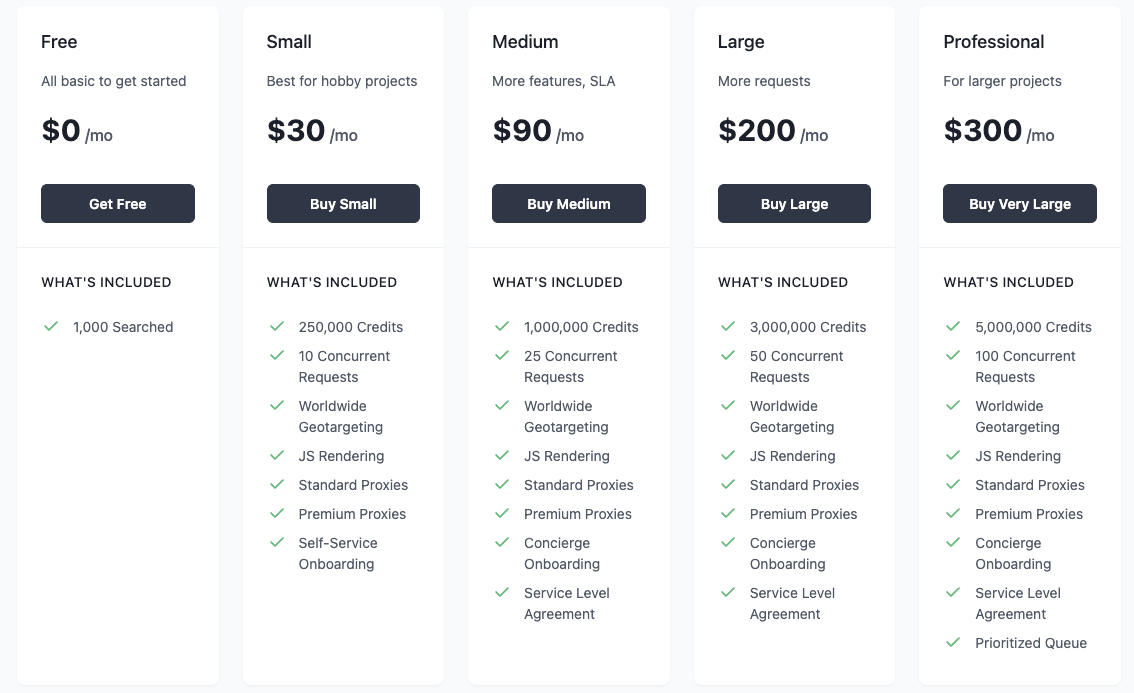Data extraction is an important process for organizations, as it allows them to gather data from diverse sources. This enables the transformation of raw data into actionable insights. Web scraping tools aid in efficient data extraction from websites, significantly reducing the time and effort required for manual data collection. Scraper API is a leading web scraping solution available for developers. However, Zenscrape is another web scraping solution that can be considered the best alternative to Scraper API. This article will compare Zenscrape API and Scraper API and provide the main differences between these two tools.
Overview of Zenscrape and Scraper API
What is Zenscrape?
Zenscrape is a top web scraping tool that focuses on simplicity and efficiency. It’s designed for both beginners and experienced users who need to extract data from websites quickly and reliably.
Its key features include
- Allowing multiple scraping tasks to run simultaneously.
- Very low API response times.
- Automatic proxy rotation.
- Access to a large proxy pool with millions of IPs.
- Extensive request builder for converting requests into production-ready code snippets.
Its key selling points are
- Location-based proxy selection for displaying geotargeted content.
- Automatic proxy rotation to avoid rate limiting.
- Supporting a modern headless Chrome browser.
Zenscrape offers a straightforward pricing model, starting at $30 for 250,000 credits. It also has a free package that includes 1,000 requests per month.
Zenscrape has servers across the world. This facilitates the scraping of geotargeted content without restrictions.
What is Scraper API?
Scraper API is a comprehensive web scraping tool designed primarily for developers and businesses requiring extensive web scraping capabilities. Its key features include
- Having residential, data center, and mobile proxies.
- A very scalable architecture.
- Equipped to handle websites with strict anti-bot measures.
- Robust JavaScript rendering to handle dynamic websites.
- Offering varied concurrency levels across its plans.
Its key selling point is automatically selecting the best proxy for each scraping request. Moreover, Scraper API adopts a tiered pricing structure, starting at $49 per month for the Hobby plan. Higher-tier plans offer more features and greater capacity for concurrent requests. Scraper API’s data centers are strategically located, but specific locations are not publicly detailed.
Also read: Scraping The Web For Data Just Got Easier With These Best Web Scraping APIs
Performance and Speed
Performance and speed are key variables when comparing the ‘best web scraping tools for 2024’. In this section, we compare the performance of Zenscrape and Scraper API based on their support for concurrency, parallel requests, API response time, and uptime. Additionally, the best data extraction services have a very large number of proxies to scale to the needs of web scraping.
| Aspect | Zenscrape | Scraper API |
| Support for concurrency and parallel requests | Yes | Yes |
| API response time | Less than 50 seconds | The website doesn’t disclose an upper limit |
| Scalability | Highly scalable thanks to millions of proxy servers and automatic proxy rotation | Highly scalable but doesn’t have as many proxy servers as Zenscrape does. |
| Uptime | 99% | 99% |
Based on the comparison table, both Zenscrape and Scraper APIs offer robust support for concurrency and parallel requests, and they both boast a high uptime of 99%. Zenscrape appears to have a slight edge in API response time. In terms of scalability, Zenscrape has an advantage with its millions of proxy servers and automatic proxy rotation.
Zenscrape stands out as a prominent scraper API alternative, offering enhanced performance with optimized response times. Its advanced architecture ensures efficient data retrieval, making it a reliable choice for high-speed web scraping operations. This superior speed positions Zenscrape as an ideal solution for businesses needing quick data access without compromising on accuracy or reliability.
Ease of Use
Top web scraping solutions should be easy to use. Being user-friendly saves your company a lot of money, as developers spending more time figuring out complex tools costs the company money. Also, if the tool has a steeper learning curve, the company has to find more talented developers who charge higher rates. Let’s compare the ease of use of these two tools in our Scraper API vs. Zenscrape comparison.
| Aspect | Zenscrape | Scraper API |
| Technical skills requirement | user-friendly choice for both beginners and those with coding experience. | This tool leans more towards users with some coding experience. |
| User management Dashboard | Very intuitive and easy to use | Dashboard supports more features but is not as intuitive as the Zenscrape dashboard |
| Quality of documentation | Extremely good. When you access the documentation after signing into your account, all code samples automatically include your API key, so you can directly copy and paste codes into your application. | Detailed documentation, but it is a bit complex to follow. Requires a good knowledge of coding. |
| Features that improve ease of use | Has a request builder that helps convert user requests into production-ready code snippets. | Scraper API also has an API playground to build API requests. But it’s still a beta version. |
In conclusion, Zenscrape emerges as a more user-friendly choice, suitable for both beginners and those with some coding experience.
Pricing
In this section, we will compare the web scraping API pricing of these two tools. We will also look at the Zenscrape vs Scraper API trial.
| Aspect | Zenscrape | Scraper API |
| Free plan | Support 1000 searches | 1,000 free API credits per month
5 concurrent connections |
| Fixed prices or Pay as you go model | Fixed prices | Fixed prices |
| Price of the lowest-paid plan | $30 / month | $49 / month |
| Key features of the lowest paid plan | 250,000 Credits
10 Concurrent Requests Worldwide Geotargeting JS Rendering |
100,000 API Credits
20 Concurrent Threads US & EU Geotargeting |
| Availability of a custom plan | Yes | Yes |
As you can see from the table, Zenscrape offers a more cost-effective solution with its lower-priced plans and a greater number of credits at each pricing tier. It’s the more attractive solution for anyone concerned about the ZenScrape vs Scraper API cost.
Reliability and Stability
In this section, we will compare the reliability and scalability of Zenscrape and Scraper API.
| Aspect | Zenscrape | Scraper API |
| Uptime | High uptime, indicating reliable service availability. | Comparable high uptime, ensuring consistent service. |
| IP Pool Quality | Offers a diverse and reliable rotating IP pool for scraping. | Quality IP pool that minimizes the chance of getting blocked. |
| Anti-Ban Features | Advanced features to bypass anti-scraping mechanisms, reducing the risk of bans. | Includes robust anti-ban mechanisms to ensure uninterrupted scraping. |
| Support CAPTCHA bypass | Yes | Yes |
| Error Handling | Effective error handling for smoother scraping operations. | Sophisticated error handling capabilities for reliable data extraction. |
| Concurrent Requests | Supports a high number of concurrent requests, ideal for scaling. | Capable of handling large-scale concurrent requests efficiently. |
| Bandwidth Limitations | Offers scalable plans with different bandwidth options. | Flexible bandwidth options to accommodate scaling needs. |
| Rate Limiting | Efficient rate limiting to manage large-scale scraping without overloading servers. | Adaptive rate limiting to ensure smooth scaling of operations. |
As you can see, both services perform very well in terms of reliability and scalability. However, Zenscrape is slightly better than Scraper API due to its better IP pool quality and rate-limiting features.
Features
Zenscrape and Scraper API both offer a number of advanced features that support your scraping activities. But which one offers the most features? Let’s take a look at it with the following table.
| Feature | Zenscrape | Scraper API |
| Proxy Types | Offers residential proxies across all plans. | Provides a range of proxies including residential, datacenter, and mobile. |
| IP Rotation | Built-in IP rotation capabilities for uninterrupted access. | Supports IP rotation for diverse and efficient scraping. |
| CAPTCHA Handling | Advanced CAPTCHA and anti-bot bypass techniques. | Equipped with CAPTCHA and anti-bot bypassing mechanisms. |
| Headless Browsing | Supports modern headless browser for JavaScript-heavy sites. | The Scraper API also supports modern headless browsing. |
| JavaScript Rendering | Capable of rendering and interacting with dynamically loaded content. | Scraper API also supports this feature |
| Google Search API Utilization | Easy integration with Google shopping API. | No specific mention of Google API integration. |
| Concurrency | Provides up to 100 concurrent threads, with more powerful concurrency in higher plans. | Offers varied concurrency levels, with up to 100 concurrent threads in top-tier plans. |
| Data Format Options | Provides data in common formats for easy integration. | Supports JSON auto parsing and other formats for versatile data use. |
This table highlights the key features of Scraper API and Zenscrape, showing their strengths and unique offerings in various areas crucial for effective web scraping. Both tools offer a range of functionalities, but they differ in specific aspects like support for Google APIs which can be decisive factors depending on the specific requirements of a project.
Account Management and Support
| Aspect | Zenscrape | Scraper API |
| Account Management Interface | Straightforward dashboard for managing subscriptions, profiles, and security settings. | Comprehensive interface offering more control over scraping activities. |
| Ease of Dashboard Use | Easy to navigate and use for monitoring API usage. | It has a lot of options and, therefore, requires you to be familiar with the dashboard for optimal use. |
| Technical Support | The responsive support team, assisted by APIlayer, offers help with a variety of issues. | Strong technical support, particularly for higher-tier plans, covering a range of issues. |
| Documentation Quality | Provides detailed documentation with code samples in multiple programming languages such as Python, Java, etc | Comprehensive documentation is helpful for users with some coding experience. |
| Responsiveness of Support | Quick and effective response to user queries and challenges. | Prompt support, with a focus on more complex scraping challenges. |
| Specialized Assistance | Supports general queries and technical challenges effectively. | Good at handling complex scraping challenges and technical queries. |
Zenscraper vs Scraper API Videos
| Zenscrape | Scraper API |
|---|---|
Conclusion
While both Zenscrape and Scraper API offer robust web scraping solutions, Zenscrape is the best web scraping tool alternative to Scraper API. This is primarily due to its key features, such as competitive pricing, the ability to handle JavaScript rendering efficiently, and having a huge IP pool. These aspects make Zenscrape particularly suitable for a wide range of users, from beginners to those with moderate scraping needs. It’s good for anyone who seeks a balance of cost, functionality, and ease of use.
Check out Zenscrape to see how it can meet your data extraction needs.
FAQs
Is Zenscrape or Scraper API better for handling complex web scraping tasks?
Both Zenscrape and Scraper API excel in handling complex scraping tasks. Zenscrape offers advanced features like modern headless browsing and high concurrency, while Scraper API emphasizes efficient IP rotation and JavaScript rendering. The choice depends on specific project requirements and preferences.
Which API is more cost-effective, Zenscrape or Scraper API?
According to this data extraction API review, Zenscrape is more cost-effective than Scraper API. The choice regarding cost-effectiveness depends on factors such as the need for premium features, scalability, and additional support services, which might differ in their pricing structures.
How do Zenscrape and Scraper API ensure data security and privacy?
Both Zenscrape and Scraper API prioritize data security and privacy. They employ measures such as premium proxies, IP rotation, and encryption protocols to protect user data. Users can also implement their own security measures to safeguard their scraping activities further.





